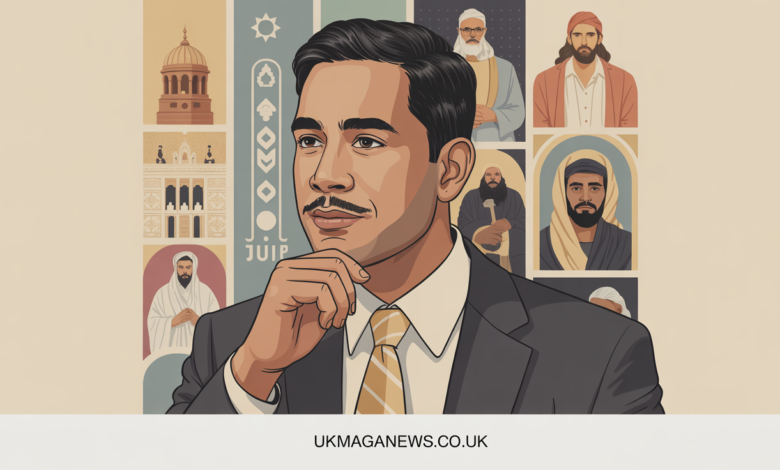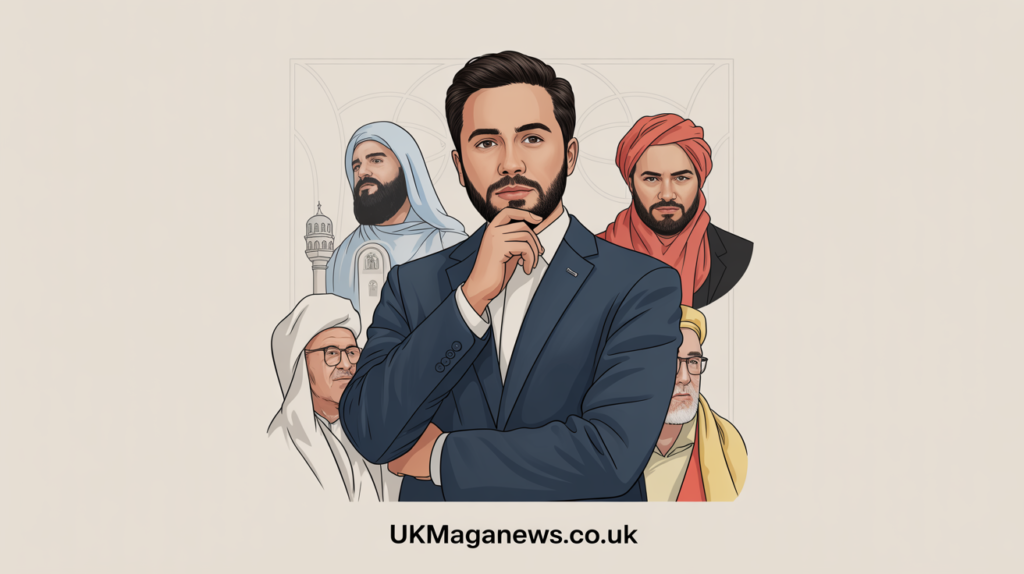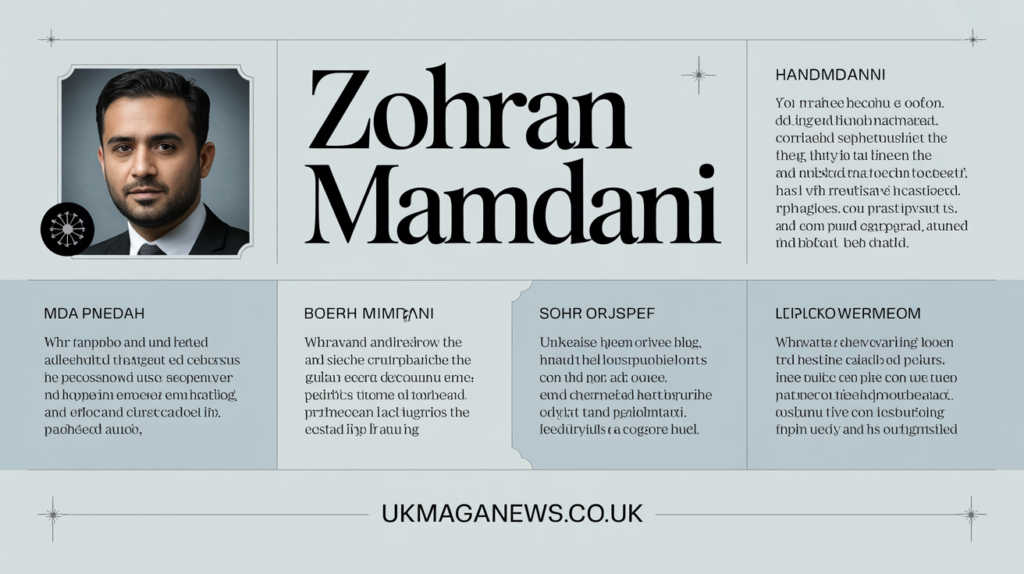Truth About Zohran Mamdani Religion and Background

Introduction
In today’s political landscape, understanding the backgrounds of our elected officials matters more than ever. People want to know what shapes their representatives’ worldviews and values. When it comes to New York State Assembly member Zohran Mamdani, questions about his religious beliefs and cultural identity naturally arise.
Zohran Mamdani religion and background have sparked curiosity among constituents and political observers alike. As a progressive politician representing Queens, he’s made waves with bold policy proposals and unapologetic advocacy for working families. But beyond the political positions, who is Zohran Mamdani, and how does his personal background influence his work?
In this comprehensive article, you’ll discover everything about Zohran Mamdani’s religious background, cultural heritage, family history, and how these elements inform his political philosophy. We’ll explore his upbringing, the values that drive his legislative work, and why understanding his background matters for anyone interested in progressive politics. Whether you’re a constituent, political enthusiast, or simply curious, this guide provides the complete picture.
Who Is Zohran Mamdani?
Zohran Kwame Rahman Mamdani serves as a member of the New York State Assembly representing District 36 in Queens. He won his seat in 2020, defeating a longtime incumbent in a primary campaign that captured national attention. His victory represented a significant shift toward progressive politics in New York.
Born on October 2, 1990, Mamdani is part of a younger generation of elected officials reshaping American politics. He grew up between multiple countries and cultures, giving him a unique global perspective. This multicultural upbringing profoundly influences his approach to policy and governance.
Before entering politics, Mamdani worked as a software developer and community organizer. He became involved in local activism around housing rights and tenant protections. These grassroots experiences shaped his understanding of the challenges facing working families in New York.
His legislative focus includes housing justice, workers’ rights, healthcare access, and climate action. He’s known for taking bold stances on controversial issues. His willingness to challenge establishment thinking has made him both a progressive champion and a polarizing figure.
Zohran Mamdani Religion and Spiritual Background
When discussing zohran mamdani religion, it’s important to understand his family’s cultural and religious heritage. Mamdani comes from a Muslim family background. His father is from Uganda, and his mother is from India, both countries with significant Muslim populations.
However, Mamdani himself identifies as non-religious or secular. He doesn’t actively practice Islam or any other religion in his adult life. This distinction matters because while his heritage is rooted in Islamic culture, his personal beliefs lean toward humanism and secular values.
Understanding this nuance is crucial. Many politicians with religious family backgrounds navigate between respecting their heritage and maintaining personal autonomy in belief. Mamdani represents this modern reality where cultural identity and religious practice don’t always align perfectly.
His secular approach doesn’t mean he disrespects religion or religious communities. In fact, he’s been a strong advocate for protecting religious freedom and fighting discrimination against Muslim Americans. He recognizes the importance of faith communities in civic life while maintaining his own philosophical independence.
The question of zohran mamdani religion highlights broader conversations about identity in contemporary America. Second-generation Americans often forge their own paths regarding faith and spirituality. Mamdani’s journey reflects this common experience among children of immigrants.
Family Heritage and Cultural Identity
Mamdani’s multicultural background significantly shapes his worldview and political philosophy. His father, Mahmood Mamdani, is a renowned scholar and intellectual from Uganda. His mother, Mira Nair, is a celebrated film director from India. This artistic and intellectual family environment profoundly influenced his development.
Growing up in such a household exposed him to diverse perspectives and global thinking. His parents’ work deals with colonialism, identity, and cultural narratives. These themes clearly inform his political advocacy around justice and equity.
The Ugandan connection through his father is particularly significant. His paternal family experienced displacement during Idi Amin’s regime, which expelled Asians from Uganda in the 1970s. This history of persecution and migration creates deep empathy for immigrant and refugee communities.
His mother’s Indian heritage connects him to one of the world’s most diverse democracies. India’s complex social dynamics around caste, religion, and class provide additional layers to his understanding of systemic inequality. These global perspectives distinguish him from politicians with purely American experiences.
Mamdani’s middle name, Kwame, reflects African heritage and Pan-African identity. This naming choice by his parents signals their commitment to honoring diverse cultural roots. It represents the beautiful complexity of his multicultural identity.
Growing Up Between Worlds
Mamdani’s childhood involved living in multiple countries. He spent significant time in Uganda, India, and the United States. This transnational upbringing gave him firsthand experience with different political systems and social structures.
Moving between cultures teaches adaptability and perspective. You learn that American ways aren’t the only ways. You understand that systems we take for granted are actually choices societies make. This realization often creates more questioning and critical thinking about existing structures.
Education played a central role in his development. He attended elite institutions, including the Dalton School in New York and later the University of Virginia. This educational privilege came with exposure to both wealth and inequality. Witnessing disparity firsthand often catalyzes progressive political awakening.
His experience as a person of color in predominantly white spaces also shaped his consciousness. Navigating these environments while maintaining cultural identity requires constant negotiation. This experience gives him insight into the challenges faced by diverse communities in America.
The combination of immigrant heritage, global perspective, and American education creates a unique political voice. Mamdani speaks to both immigrant communities and native-born Americans. He bridges different experiences while advocating for universal values of justice and equality.

Political Awakening and Activism
Mamdani’s journey into politics wasn’t typical. He didn’t start in student government or work his way up through party structures. Instead, his political consciousness developed through activism and community organizing around housing issues in Queens.
New York’s housing crisis affects millions of residents, particularly in Queens. Mamdani witnessed neighbors facing eviction and displacement due to gentrification. These real-world encounters with injustice motivated him to take action beyond just voting or donating.
He became involved with Democratic Socialists of America (DSA), the largest socialist organization in the United States. DSA focuses on grassroots organizing and challenging capitalist systems. Membership in this organization signals his commitment to fundamental economic transformation.
His 2020 primary campaign against longtime incumbent Aravella Simotas captured progressive attention nationwide. Running on an unabashedly left platform, he advocated for universal healthcare, housing as a human right, and Green New Deal policies. His victory demonstrated growing appetite for bold progressive politics.
The campaign was deeply grassroots, relying on volunteers and small donors rather than corporate money. This approach aligned with his values about democracy and representation. It proved that community organizing could overcome establishment advantages.
Legislative Priorities and Values
As an Assembly member, Mamdani focuses on issues affecting working-class constituents. His legislative priorities directly reflect the values he discusses publicly. Understanding these priorities helps clarify what drives his political work.
Housing Justice Housing remains his signature issue. He advocates for universal rent control, good cause eviction protection, and treating housing as a human right rather than a commodity. His personal experience with Queens’ housing crisis makes this fight personal.
He’s introduced legislation to strengthen tenant protections and limit landlord power. These proposals often face opposition from real estate interests, but he remains undeterred. His approach views housing policy through a moral lens rather than purely economic calculations.
Healthcare as a Right Mamdani supports single-payer healthcare at both state and federal levels. He argues that healthcare shouldn’t depend on employment or ability to pay. This position flows from his values about human dignity and social responsibility.
During the COVID-19 pandemic, he was vocal about protecting essential workers and expanding healthcare access. He criticized profit-driven healthcare systems that failed vulnerable communities. His advocacy helped secure protections for frontline workers.
Workers’ Rights Labor rights feature prominently in his legislative agenda. He supports unionization efforts, wage increases, and worker protections. His software developer background gives him insight into workplace issues across different sectors.
He’s been present at picket lines and labor actions, showing solidarity with striking workers. This visible support matters to organized labor and working families. It demonstrates that his advocacy extends beyond Assembly floor speeches.
Climate Action Environmental justice is another priority, particularly as it affects low-income communities and communities of color. He supports aggressive climate action through Green New Deal frameworks. His position acknowledges that climate change disproportionately harms vulnerable populations.
How Background Shapes Political Philosophy
The connection between zohran mamdani religion, heritage, and political values is significant even if he’s not personally religious. His multicultural background provides perspective on systemic injustice that shapes his progressive politics.
Growing up with awareness of colonialism’s legacy influences how he views power structures. His father’s scholarship on colonialism and his mother’s films exploring postcolonial identity created constant engagement with these themes. This intellectual environment fostered critical analysis of systems.
Experiencing different economic systems across countries showed him alternatives to American capitalism. Many progressive politicians who grew up only in the US struggle to imagine different systems. Mamdani’s global experience makes envisioning alternatives easier.
His family’s displacement history creates empathy for refugees and immigrants facing similar circumstances today. When politicians have personal connections to immigration struggles, their advocacy often carries greater urgency and authenticity. This personal stake drives his passionate defense of immigrant rights.
The secular humanism he embraces emphasizes human welfare and dignity without requiring religious justification. This philosophical approach grounds his politics in universal human rights rather than faith-based morality. It makes his advocacy accessible across different belief systems.
Representation and Identity Politics
Mamdani’s election represented important milestones in representation. He’s one of few Muslim-heritage politicians in New York State government. His presence matters for communities that rarely see themselves reflected in power.
However, he doesn’t emphasize identity politics in traditional ways. While proud of his heritage, he focuses policy advocacy on class and economic justice. This approach reflects socialist political theory that prioritizes material conditions over identity categories.
Some progressives debate whether this approach adequately addresses specific challenges facing marginalized communities. Mamdani argues that universal programs like Medicare for All or housing guarantees help everyone, including those facing discrimination. His theory suggests that class-based politics can address identity-based inequalities.
Critics sometimes argue that downplaying identity ignores unique experiences of racism, Islamophobia, and other discrimination. Mamdani would likely respond that fighting for all working people inherently includes fighting against these oppressions. This ongoing debate reflects tensions within progressive movements.
His election itself challenged assumptions about who can represent diverse districts. Queens is incredibly multicultural, and his global background resonates with many constituents. Representation isn’t just about checking demographic boxes but understanding diverse experiences.
Media Presence and Public Persona
Mamdani maintains an active social media presence, particularly on Twitter. His posts combine policy advocacy, constituent services, and political commentary. This direct communication style bypasses traditional media gatekeepers.
He’s been featured in national progressive media outlets like Jacobin, The Nation, and Democracy Now. These platforms appreciate his willingness to articulate bold progressive visions without apology. His media appearances help build his profile beyond his district.
Traditional media coverage sometimes focuses on his celebrity parents or his looks rather than his policy positions. This frustration is common among young politicians who want substantive discussion of ideas. He generally redirects attention toward the issues he’s advocating for.
His communication style is direct and accessible. He avoids political jargon when possible, speaking plainly about complex issues. This approach makes policy accessible to constituents who aren’t policy experts. Clear communication builds trust and engagement.
He’s also willing to criticize fellow Democrats when he believes they’re falling short. This independence sometimes creates tension with party leadership. However, it also reinforces his image as someone committed to principles over party loyalty.
Challenges and Controversies
Like any bold politician, Mamdani has faced criticism and controversy. Understanding these challenges provides a complete picture of his political career and the obstacles he navigates.
His socialist identification makes him a target for conservative criticism. Right-wing media portrays DSA politicians as radical or extreme. He generally leans into these critiques rather than backing down, defending democratic socialism as common sense rather than fringe ideology.
Within Democratic Party structures, his willingness to challenge leadership creates friction. Party discipline expects members to support leadership positions, but Mamdani prioritizes constituent interests and principles over party unity. This independence can limit his effectiveness within legislative machinery.
Some moderates worry his positions are too far left for general election viability. While this hasn’t been tested since he represents a safe Democratic district, these concerns would intensify if he sought higher office. Progressive politicians constantly navigate electability questions.
Occasional social media posts have generated controversy when critics take statements out of context. The nature of Twitter and rapid-fire political communication creates opportunities for misunderstanding. Like many young politicians, he’s learning to navigate digital communication’s pitfalls.
The Role of Religion in Contemporary Politics
Mamdani’s secular approach to politics represents a growing trend among younger Americans. Understanding this shift helps contextualize his approach and why questions about zohran mamdani religion arise.
Younger generations increasingly identify as non-religious or “spiritual but not religious.” This demographic shift affects political representation and rhetoric. Politicians like Mamdani reflect this secular worldview gaining prominence.
However, American politics still involves significant religious language and communities. Politicians must respect and engage with faith communities even if personally secular. Mamdani manages this by focusing on shared values like justice, compassion, and human dignity.
Muslim American politicians face unique challenges regardless of personal religiosity. Islamophobia remains a significant problem in American society. Politicians with Muslim heritage must navigate prejudice and stereotyping while pursuing their policy agendas.
Some progressive religious communities appreciate politicians who fight for justice without requiring religious justification. Liberation theology and religious left movements see common cause with secular progressives pursuing similar goals. These coalitions create space for diverse belief systems working together.
Future Political Prospects
Speculation about Mamdani’s political future is natural given his age and national profile. While he focuses on Assembly work currently, observers wonder about potential higher office ambitions.
New York’s political landscape offers various paths forward. He could seek Congressional seats, statewide office, or even mayoral positions. Each would require different strategies and coalition building. His current work builds the foundation for any future ambitions.
The progressive movement’s trajectory nationally affects his prospects. If movements like DSA continue growing, space for politicians like Mamdani expands. If moderate wings reassert control, his path becomes more challenging.
Building legislative achievements matters for any higher office run. Passing significant legislation demonstrates effectiveness beyond rhetorical skills. His work on housing and labor issues establishes a record he can campaign on.
Coalitions beyond his base would be necessary for citywide or statewide office. While District 36 leans progressive, broader constituencies require appealing to moderates. How he navigates this tension will determine his ceiling.
Why Understanding Background Matters
You might wonder why zohran mamdani religion and background deserve this much attention. Understanding representatives’ backgrounds helps voters make informed decisions and understand their motivations.
Personal experience shapes political priorities. Mamdani’s background explains why he emphasizes certain issues over others. His multicultural upbringing, family history, and personal values create his unique political perspective.
Representation matters for democratic legitimacy. When legislatures reflect population diversity in various ways, different perspectives get heard. Mamdani brings viewpoints that might otherwise be absent from conversations.
Authentic advocacy comes from lived experience combined with values. Politicians whose backgrounds connect to their policy positions often display greater commitment. Mamdani’s work on housing, for instance, flows from witnessing Queens’ crisis firsthand.
Understanding background also helps predict future positions on emerging issues. While politicians evolve, core values shaped by upbringing tend to remain consistent. Knowing someone’s formation helps anticipate their stances.
Lessons From His Journey
Mamdani’s path offers lessons for aspiring politicians and engaged citizens. His journey from outsider to Assembly member demonstrates what’s possible through organizing and authenticity.
Grassroots organizing can overcome establishment advantages. His primary victory proved that money and endorsements don’t guarantee success. Community trust and volunteer energy can compete with traditional political resources.
Authenticity resonates with voters tired of polished politicians. Mamdani’s willingness to speak plainly about his beliefs, even controversial ones, builds trust. Voters appreciate representatives who say what they believe rather than what polls suggest.
Multicultural perspectives are assets in diverse districts. His global background helps him connect with Queens’ immigrant communities. This understanding transcends superficial pandering to create genuine connection.
Policy specificity matters more than vague promises. Mamdani campaigns on detailed proposals rather than general platitudes. This substance-focused approach attracts voters seeking concrete solutions.
Persistence through challenges leads to change. His activism before elected office built credibility and networks. Overnight success is rare; sustained commitment to communities creates foundations for political success.
Conclusion
Understanding zohran mamdani religion and background provides crucial context for his political work. While he identifies as secular rather than religious, his Muslim family heritage and multicultural upbringing profoundly shape his worldview. His experiences across Uganda, India, and America create unique perspective on justice and inequality.
His journey from community organizer to Assembly member demonstrates the power of grassroots politics and authentic advocacy. His focus on housing justice, workers’ rights, and healthcare reflects values formed through his background and experiences. Whether you agree with his politics or not, understanding what shapes him helps explain his approach to representation.
As younger, more diverse politicians enter government, stories like Mamdani’s become increasingly common. The blend of multicultural heritage, secular values, and progressive politics represents a significant segment of younger Americans. His presence in the Assembly signals ongoing shifts in political representation.
What do you think about how personal background influences political priorities? Does understanding a politician’s heritage and values change how you view their positions? Share your thoughts and continue the conversation about representation, identity, and politics in contemporary America.

Frequently Asked Questions
What is Zohran Mamdani’s religious background? Zohran Mamdani comes from a Muslim family background, with his father from Uganda and mother from India. However, he personally identifies as secular or non-religious in his adult life. While his heritage is rooted in Islamic culture, he doesn’t actively practice Islam, instead embracing humanistic and secular values in his personal philosophy.
Who are Zohran Mamdani’s parents? His father is Mahmood Mamdani, a distinguished scholar and professor known for his work on colonialism and African politics. His mother is Mira Nair, an acclaimed film director famous for movies like “Monsoon Wedding” and “The Namesake.” Both parents are prominent intellectuals whose work explores themes of identity, culture, and postcolonial experience.
What district does Zohran Mamdani represent? Mamdani represents District 36 in the New York State Assembly, which covers parts of Astoria and Long Island City in Queens. He won the seat in 2020 after defeating longtime incumbent Aravella Simotas in the Democratic primary, running on a progressive platform focused on housing justice and workers’ rights.
Is Zohran Mamdani affiliated with any political organizations? Yes, Mamdani is a member of the Democratic Socialists of America (DSA), the largest socialist organization in the United States. His membership reflects his commitment to democratic socialist principles, including economic justice, universal healthcare, and challenging capitalist systems. This affiliation significantly influences his legislative priorities and political approach.
What are Zohran Mamdani’s main policy priorities? His primary legislative focuses include housing justice and tenant protections, universal healthcare, workers’ rights and labor organizing, climate action through Green New Deal frameworks, and immigrant rights. These priorities reflect his progressive values and respond to challenges facing working-class constituents in his Queens district.
Where did Zohran Mamdani grow up? Mamdani had a transnational childhood, spending significant time in Uganda, India, and the United States. This multicultural upbringing gave him exposure to different political systems, economic structures, and cultural perspectives. He later attended school in New York and graduated from the University of Virginia, where he studied film.
Has Zohran Mamdani faced Islamophobia in his political career? While Mamdani doesn’t actively practice Islam, his Muslim heritage makes him subject to potential Islamophobic attitudes. He has been vocal about defending Muslim Americans against discrimination and has advocated for religious freedom. As a public figure with Muslim family background, he represents important representation despite his personal secular identification.
What was Zohran Mamdani’s career before politics? Before entering the Assembly, Mamdani worked as a software developer and community organizer. His organizing work focused particularly on housing rights and tenant protections in Queens. This grassroots activism around housing issues directly informed his decision to run for office and shaped his legislative priorities once elected.
Does Zohran Mamdani plan to run for higher office? While Mamdani hasn’t announced specific plans for higher office, his national profile and age make him someone political observers watch for future ambitions. Potential paths could include Congressional seats, statewide office, or municipal positions like New York City mayor. However, he currently focuses on his Assembly work and constituent services.
How can constituents contact Zohran Mamdani? Constituents can reach Mamdani through his district office in Queens, his official Assembly email, and his social media accounts, particularly Twitter where he’s very active. His office handles constituent services including help with government agencies, community concerns, and policy input. Information is available on the New York State Assembly website.
Also Read Ukmaganews.co.uk




